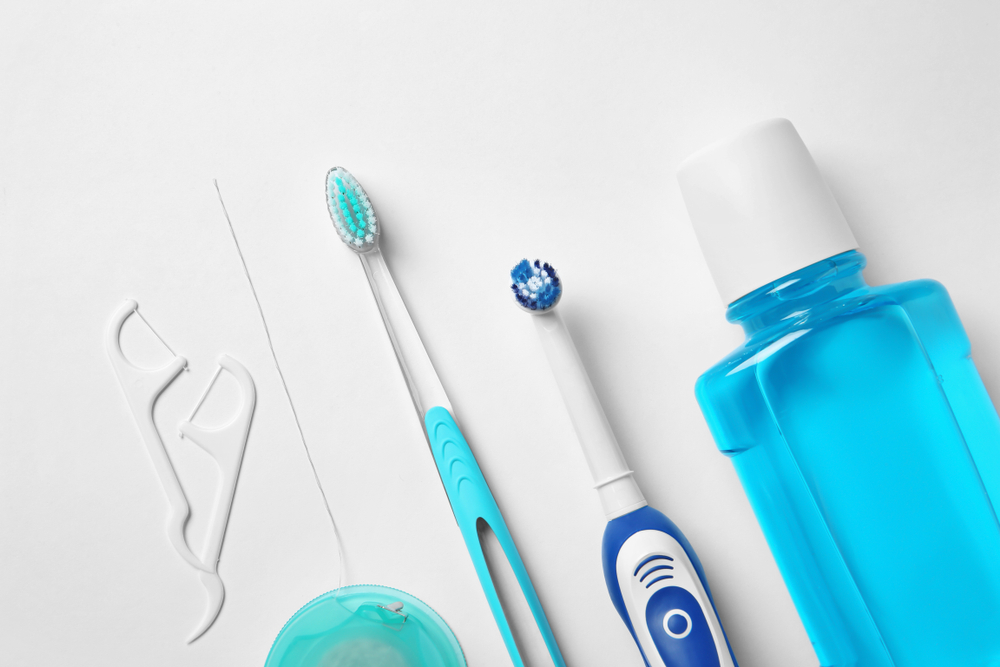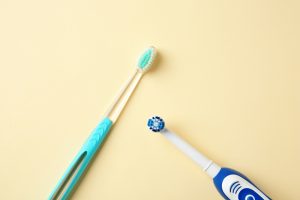

Take Excellent Care of Your Oral Health
Having good oral hygiene is essential for maintaining overall health. A crucial aspect of oral hygiene is brushing your teeth twice a day. However, with so many toothbrush options available in the market, it can be challenging to choose the right one for you. In this comprehensive guide, our Staten Island dentists will explain the different types of toothbrushes available and help you choose the best toothbrush for your oral care routine.
What To Look for in a Toothbrush
Soft Bristled Toothbrush vs Hard Bristled Toothbrush
One of the first things to consider when choosing a new toothbrush is the feeling of the bristles. Selecting a soft-bristled toothbrush is best, as a medium to hard-bristled toothbrush can cause damage to your teeth or gums, especially if you brush more aggressively (which is common). When combined with brushing too hard, the wrong type of bristles may cause toothbrush abrasion (loss of enamel) or irritate the gums.
You should also consider the type of bristle tip. Your toothbrush bristles should have rounded tips to aid in gently brushing the teeth and preventing damage to the gums and teeth.
Head Size and Design
There’s no particular standard when it comes to the head design. Either an oval or rectangular design will work best for you if it fits comfortably in your mouth. In most cases, a smaller brush head will clean more effectively, especially for those with smaller mouths. Small toothbrushes allow you to reach every tooth, including the hard-to-reach areas at the back of the mouth.
Pricing
Some cheaper toothbrush brands may be unsafe or ineffective, as they’re not held to the same standards as name brands. Cheaper toothbrushes are more likely to shed bristles and many don’t have rounded bristle tips. Choosing a quality toothbrush will save you money when it comes to your oral health in the long run.
Different Types of Toothbrushes
Manual Toothbrush
Manual toothbrushes are an effective way to clean your teeth. Since electric toothbrushes have been introduced, manual toothbrushes may seem like the lesser option. However, when used correctly, manual toothbrushes are just as effective as electric ones.
Benefits of a manual toothbrush include:
- Affordable: Choosing a manual toothbrush is typically a cheaper option.
- Widely Available: You can find manual toothbrushes at most drugstores and grocery stores, making them easier to find and purchase.
- Customizable: There are various shapes, sizes, and bristle textures for manual toothbrushes, allowing you to choose one that best suits your individual needs.
- Effective: If you know how to brush your teeth correctly, manual toothbrushes are highly effective at removing plaque and food particles.
- Portable: A manual toothbrush is easier to pack and take with you when traveling or on the go.
- Easy to Use: Manual toothbrushes are easy to use as there’s no setup, complicated instructions, and no need to remember to charge them.
When picking out a manual toothbrush, remember that not each one is made the same. If you need recommendations, ask your dentist and they’ll be happy to help you.
Electric Toothbrushes
Electric toothbrushes feature bristles that vibrate or rotate to help remove plaque from the teeth and gums. The vibrations allow for more micro-movements each time you move the toothbrush across your teeth.
Benefits of electric toothbrushes include:
- More Effective Cleaning: An electric toothbrush is designed to provide more effective cleaning than a manual toothbrush, as they generate more strokes per minute and have bristles that can rotate or vibrate, helping remove more plaque and bacteria.
- Built-In Timers: Many electric toothbrushes come with built-in timers that ensure you brush for at least two minutes as recommended by dentists. Some models even feature interval timers that remind you to switch to a different quadrant of your mouth.
- Ease of Use: An electric toothbrush is easier to use, especially for those who have limited mobility or dexterity. With the push of a button, the toothbrush does most of the work for you.
- Better for Gum Health: Electric toothbrushes can be gentler on your gums than manual toothbrushes, as they provide more consistent pressure and can help prevent overbrushing.
- Improved Oral Health: By effectively removing plaque and bacteria, electric toothbrushes can help improve overall oral health and reduce the risk of cavities, gum disease, and bad breath.
Specialized Toothbrushes
In some cases, patients may be recommended a specific type of toothbrush based on their oral health. If you wear braces, you find that an orthodontic toothbrush or interdental brush is your best option. These are both specially designed brushes that make it easier to clean your teeth while wearing braces. They feature various shapes and sizes to make sure you can clean those difficult-to-reach areas.
Frequently Asked Questions
How often should I replace my toothbrush?
You should replace your toothbrush every three to four months, or as soon as the bristles become frayed or worn. A worn toothbrush won’t clean your teeth effectively and also harbor bad bacteria.
Are electric toothbrushes better than manual toothbrushes?
Electric toothbrushes can be more effective at removing plaque and reducing gum inflammation, but manual toothbrushes can also be effective when used properly. Ultimately, the best toothbrush for you is one that you’ll use regularly and correctly.
How do I clean my toothbrush?
After brushing your teeth, rinse your toothbrush thoroughly with warm water and store it upright in a holder to air-dry. Avoid storing it in a closed container or covering the bristles as this can promote bacterial growth.
Can I use mouthwash instead of brushing my teeth?
No, mouthwash is not a substitute for brushing your teeth. While it can freshen your breath and kill some bacteria, it cannot remove plaque and food particles that brushing can.
Can toothbrushes spread disease?
Toothbrushes can harbor bacteria and viruses, but the risk of getting sick from a toothbrush is generally low. However, it’s still important to practice good oral hygiene habits, including regularly replacing your toothbrush, to reduce the risk of infection.
Find a Toothbrush You’ll Use
Ultimately, the best toothbrush is one that you’ll use. Whether you prefer a manual toothbrush or an electric one, make sure to choose the one that suits your needs and preferences. If you don’t know how to pick the best toothbrush for you, ask your dentist for recommendations!

